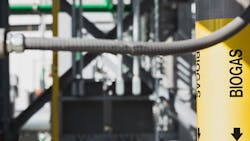SoCalGas Applies to Develop Agriculture Waste-to-Fuel RNG Pilot Project in California
Southern California Gas Co. (SoCalGas) has applied with the California Public Utilities Commission to develop a pilot project that would use agriculture waste, such as wood chips and nut shells, to create renewable natural gas (RNG).
The project will be developed in McFarland, California by San Joaquin Renewables LLC, and SoCalGas will supply its $13 million portion of the project through cap-and-trade funds.
"Converting biomass into renewable natural gas provides a sustainable and renewable source of energy from waste material," said T.J. Paskach, President of San Joaquin Renewables. "Additionally, the San Joaquin Renewables facility will help reduce our dependence on fossil fuels, will help clean the air of the Central Valley by producing a carbon-negative fuel, and will provide hundreds of high-quality jobs in McFarland."
The project will work by using a non-combustion process to turn agricultural waste into a mix of gases, including hydrogen. The mixture is then cleaned and available for use as RNG. If approved, the project will be the largest RNG project in California and produce up to 4.5 billion cubic feet of fuel each year from nearly 500,000 tons of agricultural waste, which would otherwise be burned. This is equivalent to taking 52,000 gas-powered vehicles off the road each year. The project can be ready to begin operations as soon as late 2026.
"As the State of California has recognized, renewable natural gas remains a critical tool, along with other decarbonization pathways such as electrification, hydrogen and carbon management, in our efforts to decarbonize our great state," said Neil Navin, Chief Clean Fuels Officer at SoCalGas. "Instead of burning this agricultural waste, this project could produce more RNG annually than the entire state of Hawaii uses each year, putting this waste to good use to help shore up energy reliability and resiliency as we transition to a clean energy economy."
In 2022, the California Public Utilities Commission adopted the Renewable Gas Procurement Standard, which sets goals to procure RNG made by capturing organic waste-emitted methane from wastewater treatment plants, dairies, landfills, agriculture waste, and forestry residues. The standard requires SoCalGas to replace more than 12% of traditional gas deliveries to core customers with RNG by 2030.
About the Author
Breanna Sandridge, Senior Editor
Breanna Sandridge is senior editor for EnergyTech and Microgrid Knowledge, both part of the energy group at Endeavor Business Media.
Prior to that, Breanna was managing editor for Machinery Lubrication and Reliable Plant magazines, both part of Noria Corp. She has two years experience covering the industrial sector.
She also is a 2021 graduate of Northeastern State University (Oklahoma) with a Bachelor's in English.
